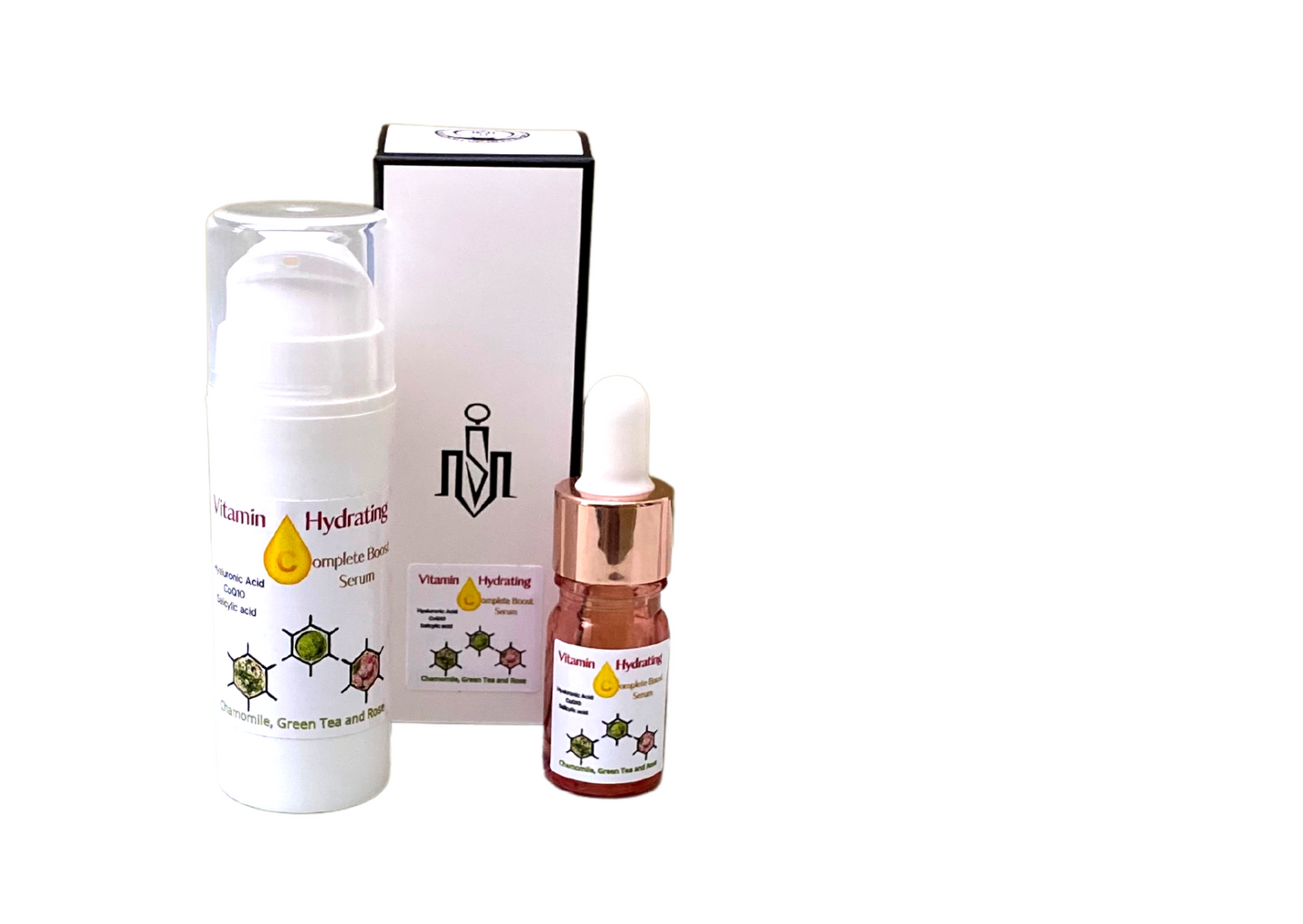scentsofman
Serum - Vitamin C Complete Boost
Serum - Vitamin C Complete Boost
Couldn't load pickup availability

See also: Copper Peptide Serum Lightening & Brightening Serum CoQ-10 & Vitamin A Serum Multivitamin Serum Resveratrol Serum
For skin that has become dry, depleted and lacks elasticity. Suitable for sensitive skin.
This serum provides the lipid/water balance necessary to maintain well-hydrated and moisturised skin. Firstly - not all forms of vitamin C are made equal! When using it topically, it is important to use a form that can penetrate the top skin layer before it has oxidised. Most forms oxidise fast. They need to get deep enough, to stimulate the elastin and collagen stores. After extensively testing available forms of Vitamin C, we chose magnesium ascorbyl phosphate (MAP), at an optimum 6% (it is in our Multivitamin and Lightening serums too). It is pure ascorbic acid (the most effective and best studied form), but with a magnesium salt added, which improves stability and reduces the risk of irritation. The ‘orange pillow case effect’ of L-Ascorbic acid is also avoided.
The botanical extracts from chamomile, green tea and rose contain a range of phenolic compounds including epigallocatechin gallate (EGCG), selenium and zinc. These help the glutamine and panthenol to reduce transepidermal water-loss (TEWL) and improve impaired barrier-function. The inflammation response, especially active in sensitive skin, is further inhibited by salicylic acid and hyaluronic acid (two molecule sizes). The antioxidant effect is increased by combining the vitamin C with vitamin E and ferulic acid. By also including CoQ-10, the antioxidant effect is boosted still further. Skin with impaired barrier-function is prone to red, scaly and inflamed areas, so, by calming these and helping to rebuild the skin strength,, it can more easily protect itself. Overall, this is a very soothing, emollient and non-oily serum. It maintains moisture, helps rebuilds elasticity and the integrity of the epidermal layers.
* We sometime forget, when focussing so hard on the skin, that consuming vitamins also helps. Vitamin C is particularly relevant, as it has been well demonstrated that when the body has enough Vitamin C, the effect of applying it topical was reduced. It needs to be consumed daily as the body doesn’t store it, but it is easy to do and your skin will benefit.
Directions for Use: Apply the serum morning and/or evening, to clean skin, using finger tips in gentle circular, upward movements (neck to forehead). Leave for two to five minutes to fully absorb, then apply face elixir and moisturiser. If using other serums, use this one after the Resveratrol and the CoQ-10 Serum, before the Copper Peptide Serum, Lightening Serum and Multivitamin Serum. To counter increased sun sensitivity, use a broad-spectrum sun cream when outside.
Vitamin C Serum - Academic research
Xu, Zhong et al, 2021- EGCG benefits on wound healing and inflammation
Rachita Lakra et al Nov 2020 - collagen and wound healing
R Gref et al Oct 2020 - Epidermal thickening and collagen production
Baumann, 2015 collagen production
Campos, Gonçalves et al; Aug 2008 - MAP Vitamin C viscoelastic/elastic ratio and TEWL.
D Darr 1992 - UVB damage
Ingredients: Lavendula angustifolia distillate water; Chamomilla matricaria flower distillate water; Glycerin; Sodium Ascorbyl Phosphate; Hydrolysed soy lecithin; Calendula flower extract; Cetyl alcohol; Camilla extract; Urea; Panthenol; Tocopherol oil; Inulin; Camellia sinensis gyokura leaf extract; Cyclomethicone; Decyl oleate; Squalane; L-Glutamine; Salicylic acid; Rosa canina fruit oil; Rubus idaesus seed oil; Azelaic acid; Ferulic acid; Hyaluronic acid (1000k Da), Phenoxyethanol and Caprylyl glycol; Sodium hyaluronate, Ubiquinone (CoQ-10); Pectin; Zinc oxide; Allantoin; Aloe barbadensis leaf powder; Pelargonium roseum flower oil; Lavendula angustifolia flower oil, Vetiver zizanoides root oil, Boswellia carter oleoresin, Anthemis nobilis flower oil; geraniol; linalool; linalyl acetate.
Share


